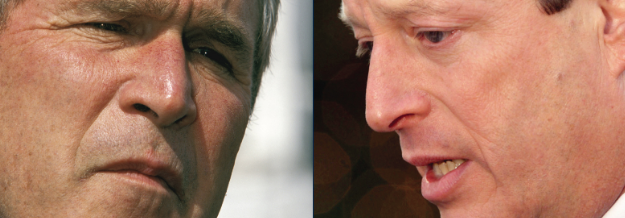Editor’s Note: This issue goes to press in the wake of much-watched elections in several southern states. The Docket asked legal historians to share commentary on resonances between their own research and the past election. Charles Zelden reflects on lessons learned (and not) since the 2000 Presidential election crisis in Florida.
When I began working on my book Bush v. Gore: Exposing the Hidden Crisis in American Democracy in the winter of 2006, I had to detail not just the history of the 2000 presidential election but also the subsequent recount and litigation madness that followed. I knew that there was something fundamentally wrong with the electoral system in Florida. Too much had gone wrong. Too many issues that should have been worked out prior to the post-election challenges were left ambiguous, self-contradictory, or not dealt with. In the course of my research I realized that the problem in Florida in 2000 was not simply one of broken voting machines, but of a broken electoral system.
This was the “hidden crisis in American democracy” of the book’s sub-title. When votes are close – really close – our electoral procedures could not adequately determine the will of the electorate. Worse yet, I realized that the system had been designed this way in response to partisan pressures and extreme competition in which winning meant more than accuracy. We weren’t willing to pay for an effective vote count. Worst of all, the system showed deep-seated disregard for the actual will of the voting public.
The events of 2000 made clear that democracy in America, as a practical matter of empowering voters to express their policy preferences, remained an aspiration rather than a reality, or even a concrete expression of intent. Florida’s electoral system was broken because Florida (through its legislature) had chosen to have a broken electoral system. Whether this choice was the result of intentional partisan malfeasance or negligent indifference was irrelevant. When it came time to count every vote because every vote counted, Florida failed the test. That state leaders were aided in this failure by a Supreme Court more concerned with closure than with equal protection only added to the surreal nature of these events. And, what’s worse, these facts were true not just of Florida but of every state in the Union. If it hadn’t happened in Florida, it could have happened elsewhere, all too easily.
Events after the 2000 recount only amplified my certainty that there was something fundamentally broken in how we ran elections in this country. One of the key lessons of 2000 was the opportunity of those who ran elections to ‘shave points’ from an election’s outcome by altering the rules and procedures by which we organized and ran our elections. Simply by shifting or modifying the hours and days available to vote, the available number of voting machines, the deadlines for vote returns, and the rules for registering to vote or gaining access to the ballot box, election officials (or state legislatures) could legally shape the voting electorate and hence, nudge electoral outcomes. This administrative gerrymandering, as I call it, was present before the 2000 election, but the events of 2000 revealed the vast potential for those in power to use this power to manipulate elections for their own partisan gains. And the revelations of administrative gerrymandering continue.
The partisans were paying attention. In the years that followed 2000, America’s elected leaders – most of them members of the Republican Party — engaged in what the election law expert Richard Hasen called “the voting wars”: an ongoing effort to impede access to the ballot box via restrictive registration rules, voter ID laws, voter purges, voting machine and precinct manipulations, and legislative gerrymandering, all aimed at keeping unwanted voters from the polls. Matching these efforts were efforts by others – mostly Democrats – to extend the vote to as many voters as possible, even at the cost of undermining certainty in election outcomes.
It is in this context that we must evaluate the current recount (or even just vote counting) controversies in Florida and Georgia (to name just two of many states with these issues). The playing field was not level in these states. Republican officials at the state level made specific choices as to the rules regulating elections that narrowed the electorate, restricted access to the polls, and shaped the vote counting procedures in ways that sought to predetermine electoral outcomes. Democrats fought these efforts in the courts and by attempting to use increased voter turnout to swamp their limiting effects. In the end, these contrasting efforts fought themselves to a near draw. Despite significant efforts to gerrymander the outcomes of the elections administratively, the massive turnout (for a mid-term election) by Democratic-leaning voters resulted in races so close that these races were thrown into extra innings. Once again, as in 2000, we needed to count every vote because every vote counted in determining the winners. Once again, an electoral system designed more to shape the electorate than to count every vote accurately, resulted in chaos, legal battles, and cries of vote stealing, electoral manipulation, or outright fraud. Once again, our electoral system proved itself broken when we needed it most. Florida, it turns out, was the next Florida. And Georgia was only a few thousand votes away from being in the exact same situation.
The crisis of American democracy remains – less hidden than in 2000 but no less significant in its effects. So long as the partisans get to run the electoral system; so long as the goal of winning at all costs out weights the need to empower voters and promote accurate vote totals, “the next Florida” is bound to occur again — and sooner rather than later. I hope, for the sake of my beleaguered state, that it will occur elsewhere. But realistically, given Florida’s purple nature and razor-thin victory margins that are the norm here with all the attendant consequences, “the next Florida” is once again likely to be – Florida. Or it could be Georgia or Mississippi or any number of other states. What made Florida, Florida in 2000 and 2018 was the closeness of the vote . . . and this could happen in any state at any time if their luck runs out and our current broken electoral system remains as it is today.



 Professor of History and Political Science at Nova Southeastern University, and author of books including
Professor of History and Political Science at Nova Southeastern University, and author of books including